
Psalm 98 is the 98th psalm of the Book of Psalms, beginning in English in the King James Version: "O sing unto the Lord a new song; for he hath done marvellous things". The Book of Psalms starts the third section of the Hebrew Bible, and, as such, is a book of the Christian Old Testament. In the slightly different numbering system in the Greek Septuagint version of the Bible, and in the Latin Vulgate, this psalm is Psalm 97. In Latin, it is known as "Cantate Domino". The psalm is a hymn psalm, one of the Royal Psalms, praising God as the King of His people. Like Psalms 33 and 96, it calls for the singing of "a new song".
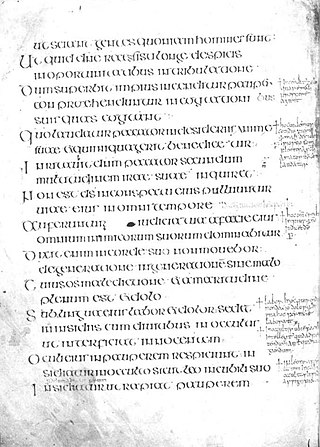
Psalm 9 is the ninth psalm of the Book of Psalms, beginning in English in the King James Version: "I will praise thee, O LORD, with my whole heart; I will shew forth all thy marvellous works." In Latin, it is known as "Confitebor tibi, Domine". The topic of the psalm is that the success of evil is only temporary, and in the end, the righteous will endure. Psalm 10 is considered part of Psalm 9 in the Greek Septuagint and in most pre-Reformation Christian Bibles. These two consecutive psalms have the form of a single acrostic Hebrew poem.

Psalm 147 is the 147th psalm of the Book of Psalms, beginning in English in the King James Version, "Praise ye the LORD: for it is good to sing praises". In the slightly different numbering system used in the Greek Septuagint version of the Bible, and in the Latin Vulgate/Vulgata Clementina, this psalm is divided into Psalm 146 and Psalm 147. In Latin, Psalm 146 is known as "Laudate Dominum quoniam bonum psalmus", and Psalm 147 as "Lauda Jerusalem Dominum".

Psalm 150 is the 150th and final psalm of the Book of Psalms, beginning in English in the King James Version: "Praise ye the LORD. Praise God in his sanctuary". In Latin, it is known as "Laudate Dominum in sanctis eius". In Psalm 150, the psalmist urges the congregation to praise God with music and dancing, naming nine types of musical instruments.

Psalm 13 is the 13th psalm of the Book of Psalms, beginning in English in the King James Version (KJV): "How long, O Lord". The Book of Psalms is part of the third section of the Hebrew Bible, and a book of the Christian Old Testament. In the Greek Septuagint and the Latin Vulgate, this psalm is Psalm 12 in a slightly different numbering system. In Latin, it is known as "Usquequo Domine".
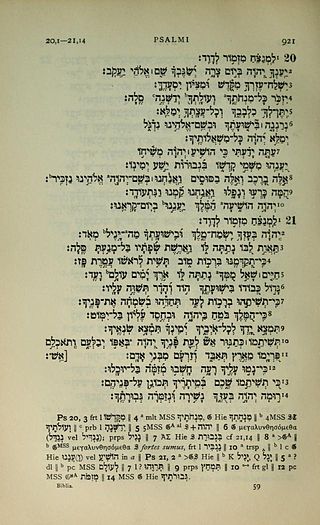
Psalm 21 is the 21st psalm of the Book of Psalms, beginning in English in the King James Version: "The king shall joy in thy strength". The Book of Psalms is part of the third section of the Hebrew Bible, and a book of the Christian Old Testament. In the slightly different numbering system used in the Greek Septuagint and Latin Vulgate translations of the Bible, this psalm is Psalm 20. In Latin, it is known by the incipit, "Domine in virtute tua". The psalm is attributed to David.
Psalm 35 is the 35th psalm of the Book of Psalms, beginning in English in the King James Version: "Plead my cause, O LORD, with them that strive with me: fight against them that fight against me." It is titled there: The Lord the Avenger of His People. The Book of Psalms is part of the third section of the Hebrew Bible, and a book of the Christian Old Testament. In the slightly different numbering system used in the Greek Septuagint and Latin Vulgate translations of the Bible, this psalm is Psalm 34. In Latin, it is known by the incipit, "Iudica Domine nocentes me". It is generally attributed to King David, although some commentators attribute it to the prophet Jeremiah.

Psalm 138 is the 138th psalm of the Book of Psalms, beginning in English in the King James Version: "I will praise thee with my whole heart". In Latin, it is known as "Confitebor tibi Domine in toto corde meo". The psalm is a hymn psalm.

Psalm 136 is the 136th psalm of the Book of Psalms, beginning in English in the King James Version: "O give thanks unto the LORD; for he is good: for his mercy endureth for ever. ". The Book of Psalms is part of the third section of the Hebrew Bible, and a book of the Christian Old Testament. In the slightly different numbering system used in the Greek Septuagint and Latin Vulgate translations of the Bible, this psalm is Psalm 135. In Latin, it is known by the incipit, "Confitemini Domino quoniam bonus". It is sometimes referred to as "The Great Hallel". The Jerusalem Bible calls it a "Litany of Thanksgiving". It is notable for the refrain which forms the second half of each verse, translated as "For His mercy endures forever" in the New King James Version, or "for his steadfast love endures for ever" in the Revised Standard Version.

Psalm 132 is the 132nd psalm of the Book of Psalms, beginning in English in the King James Version: "LORD, remember David, and all his afflictions". In the slightly different numbering system used in the Greek Septuagint version of the bible and in the Latin Vulgate, this psalm is Psalm 130. In Latin, it is known as "Memento Domine David".

Psalm 124 is the 124th psalm of the Book of Psalms, beginning in the English of the King James Version: "If it had not been the LORD who was on our side, now may Israel say". The Book of Psalms is part of the third section of the Hebrew Bible, and a book of the Christian Old Testament. In Latin it is known as "Nisi quia Dominus". It is one of fifteen psalms that begin with the words "A song of ascents". Using "conventional metaphors", it recalls the dangers faced by Israel from which the nation has been rescued.

Psalm 122 is the 122nd psalm of the Book of Psalms, beginning in English in the King James Version: "I was glad" and in Latin entitled Laetatus sum. It is attributed to King David and one of the fifteen psalms described as A song of ascents. Its title, I was glad, is reflected in a number of choral introits by various composers.

Psalm 46 is the 46th psalm of the Book of Psalms, beginning in English in the King James Version: "God is our refuge and strength, a very present help in trouble". In the slightly different numbering system used in the Greek Septuagint and Latin Vulgate translations of the Bible, this psalm is Psalm 45. In Latin, it is known as "Deus noster refugium et virtus". The song is attributed to the sons of Korah.
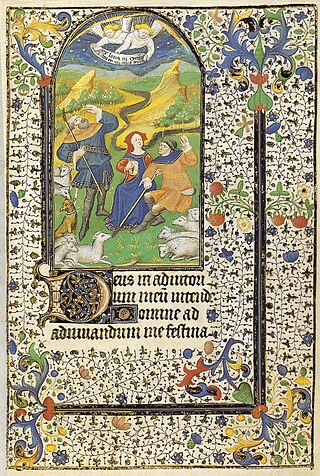
Psalm 70 is the 70th psalm of the Book of Psalms, beginning in English in the King James Version: "Make haste, O God, to deliver me". The Book of Psalms is part of the third section of the Hebrew Bible, and a book of the Christian Old Testament. In the slightly different numbering system used in the Greek Septuagint and Latin Vulgate translations of the Bible, this psalm is Psalm 69. In Latin, it is known as "Deus, in adiutorium meum intende".

Psalm 71 is the 71st psalm of the Book of Psalms, beginning in English in the King James Version: "In thee, O LORD, do I put my trust: let me never be put to confusion". It has no title in the Hebrew version. In the slightly different numbering system used in the Greek Septuagint and Latin Vulgate translations of the Bible, this psalm is Psalm 70. In Latin, it is known as "In te Domine speravi".

Psalm 76 is the 76th psalm of the Book of Psalms, beginning in English in the King James Version: "In Judah is God known; His name is great in Israel". The Book of Psalms forms part of the Ketuvim section of the Hebrew Bible and part of the Christian Old Testament. In the slightly different numbering system of the Greek Septuagint version of the bible, and in the Latin Vulgate, this psalm is Psalm 75. In Latin, it is known as "Notus in Judaea". It is one of the psalms of Asaph. It refers to the "Majesty of God in Judgment". The Jerusalem Bible regards it as an "ode to God the awe-inspiring".

Psalm 112 is the 112th psalm of the Book of Psalms, beginning in English in the King James Version: "Praise ye the LORD. Blessed is the man that feareth the LORD". In the slightly different numbering system used in the Greek Septuagint and Latin Vulgate translations of the Bible, this psalm is Psalm 111. In Latin, it is known as Beatus vir qui timet Dominum. It is a psalm "in praise of the virtuous". This psalm, along with Psalm 111, is acrostic by phrase, that is, each 7-9 syllable phrase begins with a letter of the Hebrew alphabet in order.
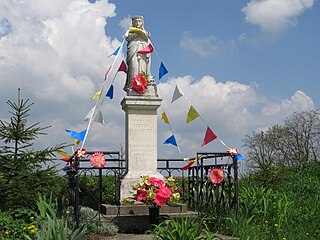
Psalm 115 is the 115th psalm of the Book of Psalms, beginning in English in the King James Version: "Not unto us, O LORD, not unto us, but unto thy name give glory". It is part of the Egyptian Hallel sequence in the fifth division of the Book of Psalms.
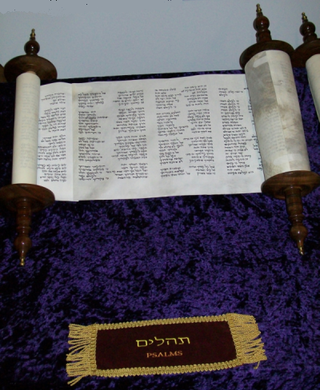
Psalm 116 is the 116th psalm of the Book of Psalms, beginning in English in the King James Version: "I love the LORD, because he hath heard my voice and my supplications". It is part of the Egyptian Hallel sequence in the Book of Psalms.

Psalm 118 is the 118th psalm of the Book of Psalms, beginning in the English of the King James Version: "O give thanks unto the LORD; for he is good: because his mercy endureth for ever." The Book of Psalms is part of the third section of the Hebrew Bible, and a book of the Christian Old Testament. In the slightly different numbering system used in the Greek Septuagint and Latin Vulgate translations of the Bible, this psalm is Psalm 117. In Latin, it is known as "Confitemini Domino quoniam bonus quoniam in saeculum misericordia eius". Its themes are thanksgiving to God and reliance on God rather than on human strength.



















